Selecting the right mineral water for your baby’s needs can feel like a daunting task, particularly for new parents. With a plethora of brands and different mineral compositions available in the market, it’s challenging to identify which one aligns best with your little one’s nutritional requirements. That’s where this comprehensive guide comes in.
This article will take you on a journey through the complexities of mineral water, shedding light on the importance of different minerals, understanding labels, and providing practical tips for making the best choice for your baby. This guide is designed to empower parents with knowledge, dispel common myths, and help ensure your baby’s optimal health and development.
So whether you’re using mineral water for formula preparation or transitioning your toddler to regular drinking water, we’ve got you covered. Let’s dive in!
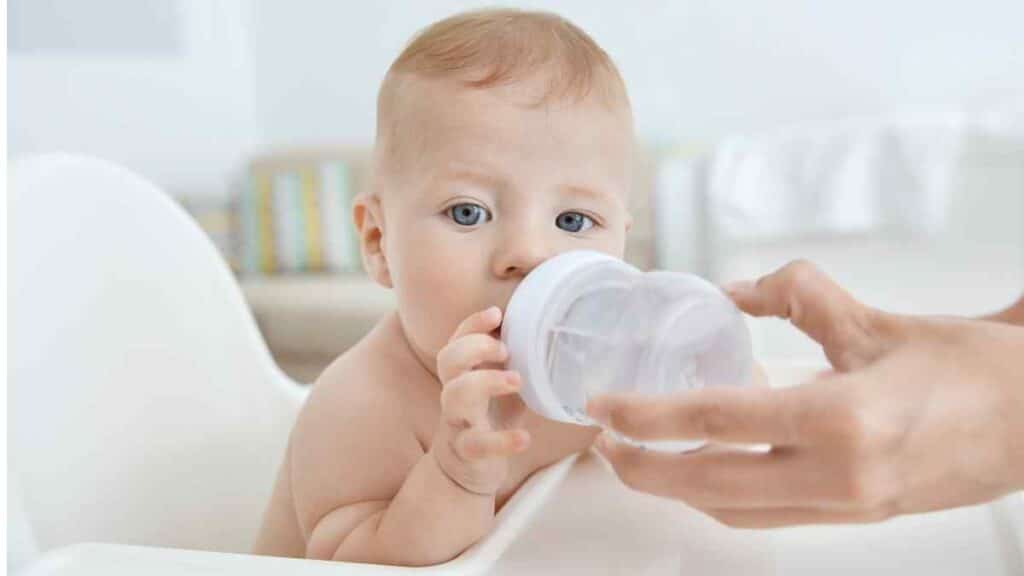
Types of Drinking Water for Babies
Navigating the ocean of information about different types of drinking water for babies can be overwhelming for many parents. So let’s dive deep and break down the distinctions between bottled water, tap water, spring water, natural mineral water, distilled water, and other available varieties.
Tap Water
Tap water, readily available from the faucets of our homes, is generally safe for older infants and toddlers. However, having your water tested is essential if it comes from a private well or if your home has lead pipes. Boiling tap water can also make it safer for your baby, especially for formula preparation during the first few months [1].
Bottled Water
Bottled water, another common choice, comes in various forms, with distinct processes and sources defining their type. The International Bottled Water Association classifies bottled water into four main categories: spring water, purified water, mineral water, and sparkling water.
Spring Water
As the name implies, spring water is sourced from a natural spring. While it often contains a range of minerals beneficial for health, the mineral content can vary significantly between brands, making it essential to check the label.
Natural Mineral Water
Natural mineral water is a premium type of bottled water originating from a protected underground water source. It’s characterized by its constant level and relative proportions of mineral salts, with no or very limited treatment. Bottled mineral water may provide your baby with additional essential minerals like calcium and magnesium.
Purified Water
Purified water undergoes a treatment process to remove contaminants. This includes methods like reverse osmosis, which uses a semipermeable membrane to remove impurities, and distillation, which involves boiling water and collecting the steam. Distilled water, a type of purified water, has had nearly all of its minerals removed, which can make it less favorable as a regular source of drinking water for babies due to the lack of beneficial minerals.
Purchased bottled water, whether spring, mineral, or purified, is generally safe for babies, but it’s essential to ensure it’s not carbonated. Sparkling water, or water into which carbon dioxide has been dissolved under pressure, isn’t suitable for babies as it can cause gas and upset their little tummies.
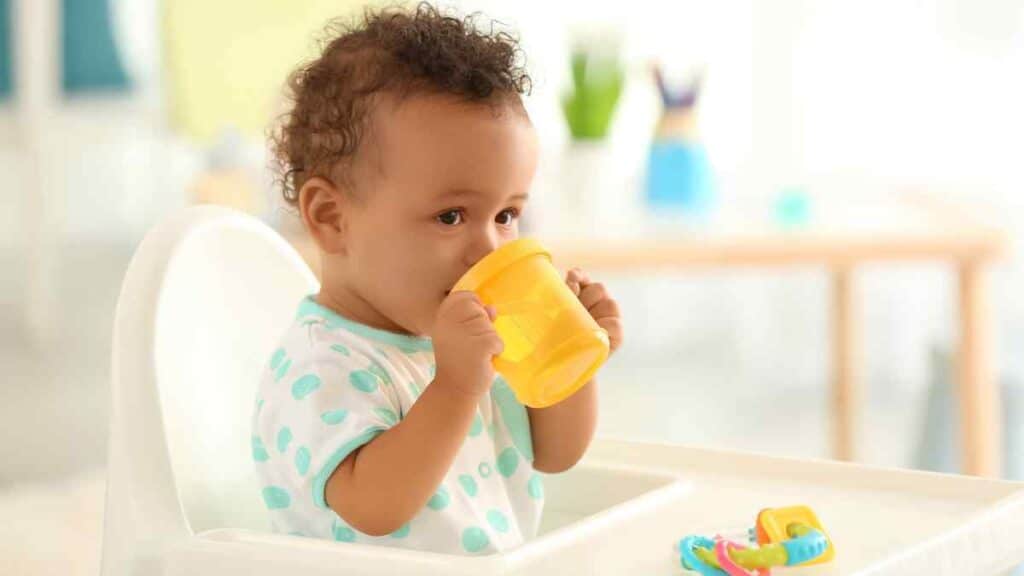
Is Mineral Water Good for Your Baby?
As we’ve explored the various types of drinking water for babies, you may wonder if mineral water is the best choice for your little one. In this column, we will delve into the benefits of mineral water and how it compares to other options like tap water, spring water, and purified drinking water.
The Food and Drug Administration (FDA) regulates bottled water, ensuring it meets specific safety and quality standards. However, not all bottled water is created equal, and the mineral content can vary significantly between brands. This variation is essential to consider when choosing a bottled water brand for your baby.
One of the most significant benefits of mineral water is the presence of essential minerals, such as calcium and magnesium, which support your baby’s growth and development. Drinking spring water and mineral water can provide these essential minerals in addition to what your baby receives from their diet. Unlike purified drinking water, which undergoes processes like reverse osmosis and distillation to remove impurities, mineral water retains its natural mineral content.
Some mineral water brands even offer alkaline water, which has a higher pH than regular water. Advocates of alkaline water claim that it can neutralize acid in the body and provide potential health benefits. However, the scientific evidence supporting these claims is limited, and more research is needed to determine if alkaline water is beneficial for babies.
While mineral water has its advantages, there are some factors to consider when choosing the best water for your baby. One aspect is the total dissolved solids (TDS) level, which indicates the concentration of dissolved substances in the water. High TDS levels can indicate the presence of contaminants, so it’s essential to check the label and ensure the TDS level is suitable for your baby.
Another concern is the packaging. Some plastic bottles used by bottled water companies can contain chemicals that may leach into the water, especially when exposed to heat or sunlight. Opting for a reputable bottled water brand that uses safe and high-quality packaging materials can help mitigate this risk.
Lastly, it’s worth noting that municipal water supplies in many areas are safe and regulated, making tap water a viable and cost-effective option for older infants and toddlers. However, parents should consider boiling tap water or using a water filter for added safety, especially for younger babies.
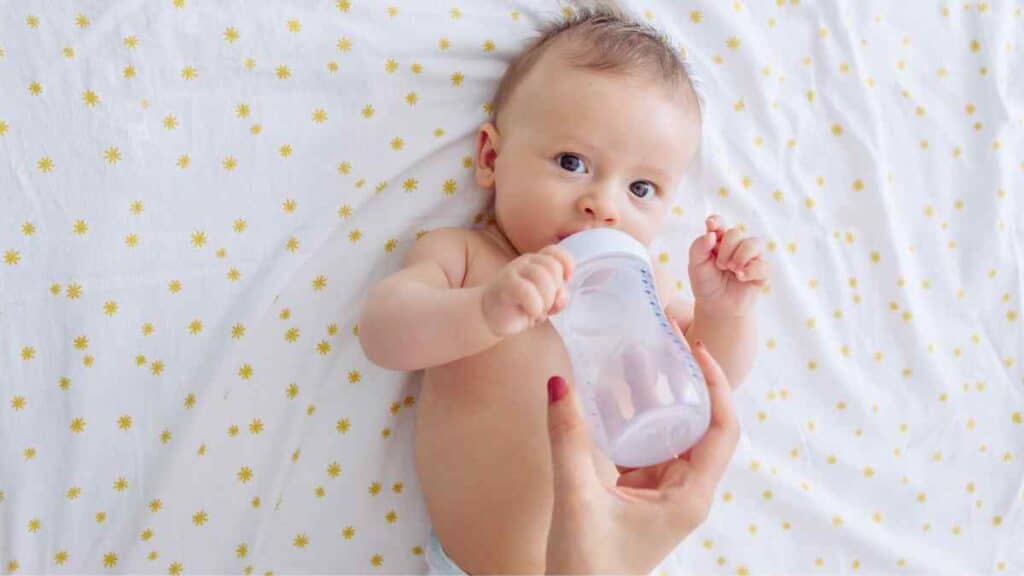
Different Types of Bottled Water For Babies
In our previous column, we explored the benefits of mineral water for babies and discussed the importance of choosing the right type of water for your little one. As a natural progression, let’s delve into the various types of bottled water available and how they differ from one another. This column, titled “Different Types of Bottled Water for Babies,” will provide an overview to help you make an informed decision when selecting water for your baby.
Tap water
While tap water is readily available and regulated by municipal water supply systems, it may not always be the best option for young infants. Boiling tap water or using a home water filter can improve its safety, especially for babies under six months of age. As your baby grows, tap water can be a suitable and cost-effective choice as long as it meets safety standards.
Spring Water
Spring water flows naturally from an underground source and is bottled at the source. It contains various minerals that are beneficial to the human body. Spring water can be a good option for babies, as it retains its natural mineral content. However, always check the label for information on the source, treatment process, and the million total dissolved solids (TDS) to ensure the water’s safety and suitability for your baby.
Distilled Water
Distilled water is produced by boiling water and collecting steam, which leaves behind impurities. This process results in water with a higher boiling point and a lower mineral content. While distilled water is safe for babies, it lacks the essential minerals found in spring and mineral water, making it a less ideal choice as a regular source of drinking water for your little one.
Reverse Osmosis Water
Reverse osmosis (RO) water undergoes a purification process that removes contaminants by forcing water through a semipermeable membrane. While RO water is often referred to as “filtered water,” it’s important to note that this process also removes many beneficial minerals. As a result, RO water might not be the best choice for babies as their primary drinking water source.
Sparkling Water
Sparkling water is carbonated, either naturally or artificially, by dissolving carbon dioxide into the water under pressure. Due to its carbonation, sparkling water can cause gas and discomfort in babies, making it an unsuitable choice for their consumption.
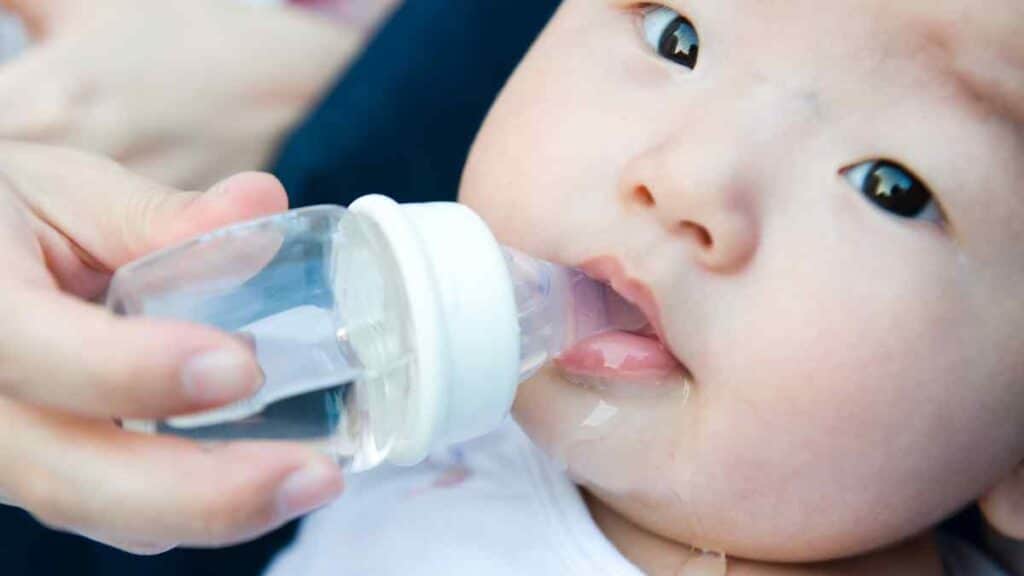
How Should Bottled Mineral Water Be Stored?
As we have discussed the different types of bottled drinking water for babies, it’s equally important to consider the correct storage of bottled water. Proper storage can maintain the quality and safety of the water, ensuring your little one receives the health benefits from its essential minerals. Let’s discuss a comprehensive guide broken down into several sub-sections.
Understanding the Importance of Proper Storage
Bottled water, including spring water and mineral water, is regulated by the Food and Drug Administration (FDA) to ensure its safety and quality for human consumption. However, even with these regulations, the way you store bottled water can affect its safety and taste. Poor storage conditions can potentially lead to the leaching of chemicals from plastic bottles into the water, which could impact your baby’s health.
Choosing the Right Storage Location
Many bottled water companies recommend storing their products in a cool, dry place away from chemicals, solvents, and strong odors. Heat and sunlight can degrade the plastic over time, potentially releasing harmful substances into the water. Therefore, avoid storing bottled water in places like a garage or a car trunk, particularly during the summer months.
Refrigerating Bottled Water
While it’s not necessary to refrigerate unopened bottled water, once opened, it’s best to keep it chilled to slow down the growth of any potential bacteria. However, be sure to consume it within a few days after opening for the best quality and safety.
Use of Reusable Water Bottles
If you’re transferring water from a purchased bottle to a smaller, reusable water bottle for convenience, ensure the reusable bottle is made of a safe material and is cleaned regularly. Plastic bottles marked with recycling codes 1, 2, 4, and 5 are generally considered safe for reuse. Always wash and thoroughly dry reusable water bottles between uses to prevent bacterial growth.
Transitioning to Home Water Purification Systems
For those considering a shift from bottled water to tap water, consider using a home water purification system to ensure the water’s safety. Systems such as reverse osmosis and water filters can effectively remove contaminants while preserving other minerals beneficial to the human body. Always follow the manufacturer’s instructions for maintaining and replacing these systems to ensure optimal performance and safety.
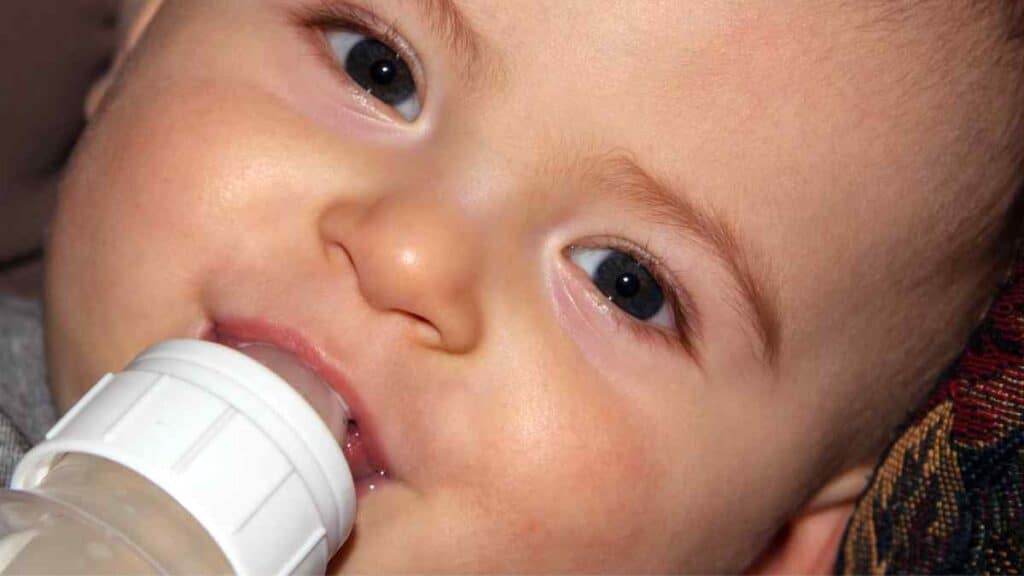
What is the Healthiest Water To Drink For Your Baby?
As we delve into the proper storage of bottled mineral water to maintain its quality and safety, let’s turn our attention to the crucial question: What is the healthiest water to drink for your baby? With numerous options available in the market, from spring waters to artesian water, this question is more relevant than ever for parents.
Understanding Water Types
When it comes to drinking water, different types come with varying mineral content and potential health benefits. Bottled waters often undergo a filtration process to remove any impurities, and some brands even have their own bottling plant to ensure the water’s safety and quality. However, not all bottled waters are created equal.
Spring and Artesian Water
Spring waters flow naturally from a spring and usually contain beneficial minerals. Artesian water, on the other hand, comes from a well that taps into a confined underground aquifer. Both types of water can be excellent choices for your baby due to their natural mineral content. However, always check the labels for any additional treatments or processes these waters may have undergone before reaching the bottle.
Filtered Tap Water
While normal water directly from your tap may not always be the best option for young infants, it can be made safer and healthier through the use of water filters. These filters effectively remove chlorine, lead, and other contaminants, providing you with clean and safe drinking water for your baby. Plus, it’s a more environmentally-friendly choice compared to single-use plastic bottles.
Mineral Water
Mineral water, as we’ve discussed in our previous columns, contains essential minerals like calcium and magnesium that are beneficial for your baby’s growth and development. The mineral content, however, can vary significantly between brands, so it’s essential to check the labels.
Determining the Healthiest Water for Your Baby
So, what’s the healthiest water for your baby? The answer largely depends on your baby’s age and specific nutritional needs, the water quality in your area, and your personal preferences. Purified or boiled tap water is usually recommended for younger infants, especially those under six months. Spring water, artesian water, or mineral water can be healthy choices for older babies and toddlers due to their natural mineral content.
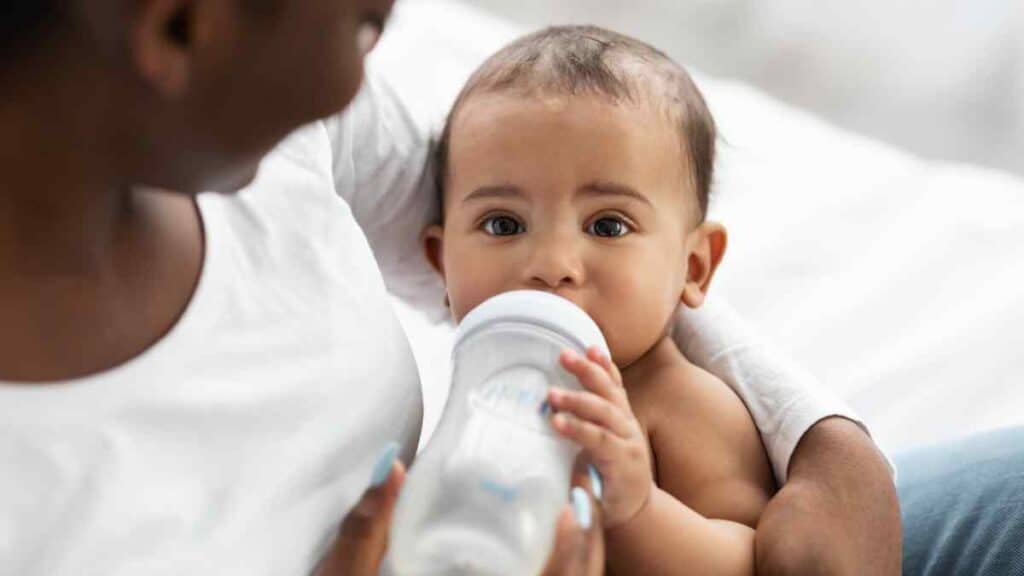
Telltale Signs of Infant Dehydration

It’s only standard for a parent to get worried about their baby, especially if they notice signs of dehydration. So, here are a few symptoms of infant dehydration to serve as a guide. If you see any of these signs, it’s best to get in touch with your pediatrician.
- Fewer diaper changes compared to previous days/ lack of wet diapers
- Showing increased signs of exhaustion
- Sunken fontanelle, or the soft spot located on the infant’s head
- Dry mouth
- There aren’t any tears when the baby is crying
Conclusion
Choosing the right water for your baby is an essential part of their growth and development. As we’ve navigated the complexities of different types of waters, from spring to mineral water, we’ve underscored the importance of understanding their unique characteristics, benefits, and potential risks.
Remember, not all bottled waters are created equal, and the mineral content can vary significantly between brands. Hence, it’s crucial to read labels carefully and understand what you’re providing to your little one. And while mineral water can offer some health benefits due to its essential minerals, factors like total dissolved solids (TDS) levels, packaging materials, and storage conditions should not be overlooked.
For parents considering a shift from bottled water to tap water, using a home water purification system or water filter can help ensure the water’s safety. And, regardless of the type of water you choose, proper storage is key to maintaining its quality and safety.
In conclusion, the journey to finding the best mineral water for your baby requires careful consideration and research. Always remember to consult with a healthcare professional for personalized advice and guidance. Your child’s health and well-being are of utmost importance, and every drop of water contributes to their growth, development, and overall health. With this guide, we hope you feel more empowered and informed in making the best choices for your baby’s hydration needs.
Did this article help answer your question? We’d love to hear from you! Have a question? Let us know in the comments.



